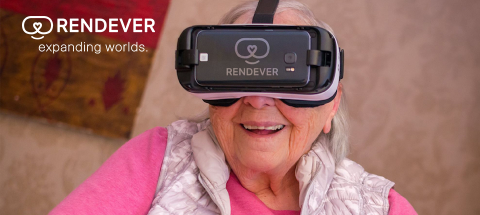
In an era where Americans are feeling hyper-connected by digital technology, some citizens are feeling more isolated than ever before. While no demographic is spared from this phenomenon, senior citizens are more frequently grappling with challenges that stem from this isolation and loneliness. The U.S. healthcare system has recently begun to recognize these challenges, but it’s a company based in Cambridge that is pioneering novel technologies to help alleviate the issues brought about by isolation and loneliness in old age.
While there is no one-size-fits-all solution to this problem, innovators like Rendever CEO Kyle Rand are developing new ways to help seniors stay connected in their later years. Kyle and his team have developed a virtual reality (VR) platform that gives seniors the ability to experience new places and revisit cherished memories. The company’s goal is simple, yet critically important one: to make seniors feel happier and less isolated.
What inspired you to develop Rendever and this virtual reality platform?
I grew up volunteering in an assisted living facility; specifically I spent a lot of time serving ice cream with my friends. It was an amazing experience because I got to know many of the residents but in such a simple way: I learned a little about them and their favorite ice cream. It made their day. It was a really powerful experience for me as a kid.
Later, I went to school and studied cognitive decline and decision making models. A lot of this studying required interacting with seniors. When I graduated, I moved my grandmother into an age-friendly community. She was a professor, she was a nurse, she was even a brain cancer survivor. Then she was diagnosed with cancer again and she fell into that trap of not having any engaging activities. We watched this incredibly smart woman decline really quickly on the cognitive scale in just a few months.
Once you have that experience you know there is a need to focus on this particular industry and think about digital health in a way that’s tailored to seniors.
Isolation is a complicated thing to measure. What is the business value of solving this problem and to whom?
It’s estimated that social isolation is the equivalent of smoking 15 cigarettes a day. Nearly half of women and a quarter of men over 75 report living isolated lives. The estimated financial impact from social isolation on Medicare is $6.7 billion per year.
Social isolation is a real problem. People don’t realize this. They don’t realize this is a public health crisis, not just an unfortunate feeling that is situational.
How are you approaching caregivers?
Caregivers themselves face a huge economic burden and a great deal of mental health strain - an incredible number of stressors and anxiety come with this responsibility. There’s not a lot of ways to intervene there because they’re so focused on what they need to do as a caregiver. So being able to provide an avenue and a platform for them to experience something special with those that they are providing care for, that creates positive emotions and memories- that’s huge!
Aging seniors right now are learning how to Skype, they’re learning Facetime, but they need help with their daily living activities. Whoever you are, when you start helping a loved one with those activities of daily living, the more and more you do it, the more ADLs (activities of daily living) you’re helping with, the easier it is to forget the human aspect. If you’re focused on diaper changing, if you’re focused on feed schedules, you lose that human aspect.
What does the phrase Digital Health mean to you or your company?
People don’t really associate digital health or anything that's tech or new age technology with seniors. It exemplifies that this is a real issue that not a lot of people understand that social isolation has huge health implications. While we’re focused on something that’s not stereotypically digital health, we’re looking at using technology to improve a serious health problem that is affecting a large population of individuals.
While you’re focused on seniors, we know that social isolation is not limited to them.
There’s a lot of data looking at social isolation and we’re getting to the point now where we’re pushing it into the forefront of people’s minds. Being lonely isn’t just a temporary state, it is a potential mental health disorder. There is a huge connection between mental health and physical health. Understanding that social isolation is an aspect of mental health is huge.
We’re just now getting to positive changes in the environment: the UK just appointed a minister of social health this year focused on creating government-based programs to make people more connected to each other. I think it was this decade that the World Health Organization recognized your social structure as an actual determinant of health.
Now, there are companies like us, like Eversound, that are focusing on using technology to help people connect. This is where VR is different. No matter where you are, no matter what your limitations, no matter what your economic limitations are, if you have access to the internet and have access to a headset, you can connect with people all over the world. Whether that’s with VR games, traveling the world in VR, or whatever, I just think VR is one of the perfect technologies to address social isolation.
What has your experience with the MassTech Intern Partnership program been like?
It has been incredible. We were able to ramp up a lot faster. We had one intern in a senior living facility. We had another who could handle the web platform, the stack engineering side for family members. Our experience with them in the summer was amazing. One of them even ended up becoming a full time co-op for us.
